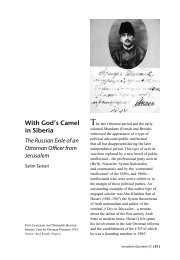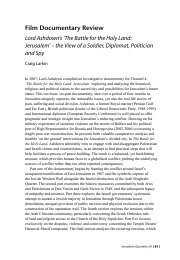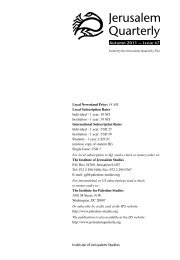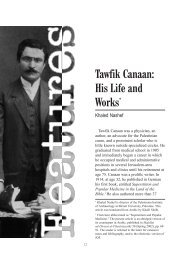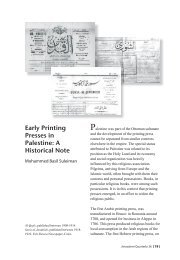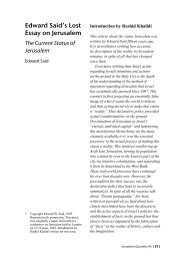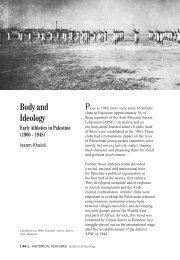PLUNDERING PALESTINE - Jerusalem Quarterly
PLUNDERING PALESTINE - Jerusalem Quarterly
PLUNDERING PALESTINE - Jerusalem Quarterly
You also want an ePaper? Increase the reach of your titles
YUMPU automatically turns print PDFs into web optimized ePapers that Google loves.
That may be true, but conditions in those countries are not nearly as bad as they are<br />
in Israel, or disastrous as in the occupied Palestinian territories. According to the<br />
IAA, over 100.000 artefacts are sold in Israel yearly. 17 In the year 2000, agents for<br />
the IAA uncovered a container filled with hundreds of ancient artefacts ready to be<br />
shipped to the United States. It was believed to be one of the largest illegal shipments<br />
of antiquities ever detected. All the artefacts are believed to have been pillaged<br />
from archaeological sites in the West Bank. The finds included hundreds of pieces<br />
of ancient pottery, glass and bronze items, coins, carved stonework, and more. 18 In<br />
another incident, agents of the IAA confiscated more than 700 artefacts, most of which<br />
were plundered from tombs around <strong>Jerusalem</strong>, Beit Guvrin (Sandahanna, Asqalan)<br />
and the Judean Hills. The artefacts contained hundreds of very well-preserved Teta<br />
drachma coins from the Hellenistic period, as well as hundreds of bronze coins,<br />
dozens of beads, gold earrings, scarabs, figurines and stoneware, most of it from the<br />
Biblical period. In 2002, authorities found 15 tons of stolen antiquities in the home<br />
of an Israeli from Caesarea; the cache included marble pillars from the Roman period<br />
and a Jewish coffin made of stone. 19 The collectors’ lobby has been able thus far to<br />
pressure the Israeli parliament not to change the laws that allow them to continue<br />
buying antiquities on the open market. They are certainly aware that almost all of<br />
these objects originate in the occupied territories.<br />
Managed antiquities markets that officially sanction the trade in artefacts are legal in<br />
only a few countries in the world, including the US and Britain. Except for Israel, all<br />
countries of the Middle East and the Mediterranean region decided long ago to ban<br />
the trade in antiquities. In the Palestinian areas, an antiquities law under discussion<br />
appears to favour legalizing the trade in archaeological artefacts. If that law were to<br />
be passed by the Legislative Council, it would be a disaster for Palestinian cultural<br />
heritage, particularly because the West Bank has no regulated market for antiquities<br />
and any future market will be subsidiary to the flourishing Israeli antiquities market.<br />
If Israel Disengages: The Gaza Example<br />
In 2005, Israel’s withdrawal from Gaza and small areas of the West Bank caused<br />
Palestinian archaeologist to worry that numerous priceless archaeological sites and<br />
artefacts would also be removed. According to international law, it is illegal for an<br />
occupying power to remove ancient artefacts, movable and immovable, from an<br />
occupied land. The pretext that Israel has used to justify its activities, however, is that<br />
Palestinians are unable to safeguard ancient sites in the West Bank and Gaza, where<br />
looting is common.<br />
In the course of the Gaza disengagement, for example, Israel threatened to remove<br />
the John the Baptist mosaic from Gaza and take it to a museum in Israel. The John<br />
[ 52 ] FEATURES VieLooting and ‘Salvaging’




![In Search of Jerusalem Airport [pdf] - Jerusalem Quarterly](https://img.yumpu.com/49007736/1/180x260/in-search-of-jerusalem-airport-pdf-jerusalem-quarterly.jpg?quality=85)

